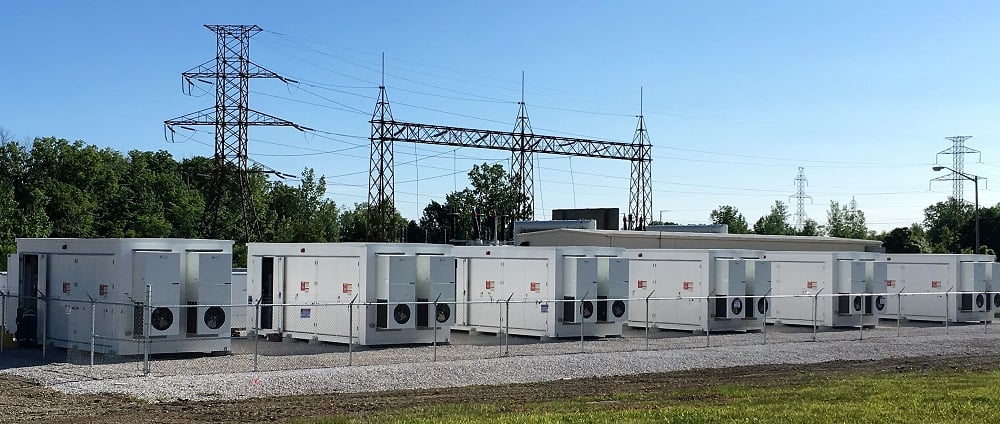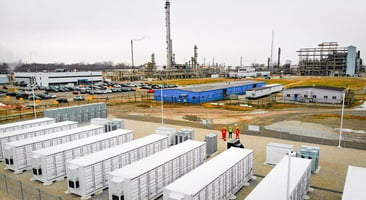Enhancing Grid Reliability and “Shaving” Summer Peaks with PEAK IQ®: Energy Storage Optimization

2023 was the hottest year on record and dangerously close to the limits set by the Paris Agreement—signaling the stark urgency of the climate crisis and the imperative to redouble our efforts to accelerate the clean energy transition. We know that the future of energy depends on our ability to store it—and the future of the planet depends on our ability to drastically reduce our carbon footprint.
Higher-than-normal temperatures can also threaten our electrical infrastructure. Higher temperatures increase electricity demand for air conditioning, increasing the risk of blackouts and brownouts.
According to the North American Electric Reliability Corporation’s (NERC) 2024 Summer Reliability Assessment, parts of the United States could face electricity supply shortages if demand peaks higher than anticipated or if less electricity is generated than expected. While NERC expects adequate power resources under normal summer conditions, certain regions—including California, the Southwest, the Midwest, Texas, and New England—are at elevated risk during extreme heat. These rising temperatures and extreme heat waves are not unique to the United States and are a part of a larger trend of rising temperatures supercharged by climate change.

This year, however, the power sector is also grappling with distinct challenges. NERC highlighted the challenges of meeting peak demands as baseload generation retirements rise and variable resources like solar and wind replace traditional power plants. Taken together, these factors are contributing to a “hypercomplex risk” environment that could affect grid reliability and security.
What does this mean for energy-intensive businesses? The possibility of more expensive, less reliable electricity. In this blog, we’ll explore how battery storage can lower your energy costs and improve grid reliability (and sustainability)—if it is effectively operated.
How Energy Storage Can Help the Electric Grid … and Your Bottom Line
Energy storage systems allow electricity to be stored—and then discharged—at the most strategic times. Today, Lithium-ion batteries, the same batteries that are used in cell phones and electric vehicles, are the most common form of energy storage. Like the batteries in your cell phone, industrial-scale battery energy storage systems can be charged with electricity from the grid, stored, and discharged when there is a deficit in supply or when energy is most expensive which saves customers money.
What makes energy storage the linchpin of the clean energy transition is its ability to store energy when it’s not needed for when it is needed most (i.e. the hottest hours of the hottest days of the year). These hours, often referred to as “grid peaks,” are often subject to “time of use” pricing. In other words, electricity is most expensive when it is in greatest demand.
During summer months, many utilities will place a premium on electricity consumption when the grid is most constrained through increased energy charges, demand charges, or both. The installation of an on-site battery energy storage system can help hedge against rising costs by shaving a facility’s energy usage during grid peaks and shifting load to hours where energy is least expensive.

Convergent Energy and Power (Convergent) is a leading provider of energy storage solutions in North America with over a decade of experience. To optimize our battery storage systems, Convergent charges our battery storage systems when electricity is less in demand and energy costs are cheaper; we discharge the battery storage system when energy is most in-demand and most expensive. This can save businesses around seven figures per year and cut carbon emissions.
“Peak Power Shaving” 101
Grid peaks usually occur during the hottest hours of the hottest days, driven by high temperatures and correspondingly high HVAC loads. That’s why the summer months (May through September) are often referred to as “peak season.” That said, not all coincident peaks happen during these hottest months and can be driven by factors beyond ambient temperatures.
One of the primary uses for battery storage is “peak power shaving” or just “peak shaving.” This involves both predicting grid peaks (when electricity is most in demand and therefore most expensive) and dispatching a battery storage system during those grid peaks.
The act of predicting and discharging the battery at these hours is called “peak power shaving,” “peak chasing,” or “peak hitting” because it allows a customer to strategically reduce their dependence on the electric grid during peaks.
How Convergent’s PEAK IQ® Energy Storage Intelligence Can Lower Your Utility Bill
While it varies by region and electrical load, the cost of using energy from a battery storage system—rather than the grid—during these “coincident demand peaks” can lower business’ energy bill by up to 40%.
Convergent’s PEAK IQ® energy storage intelligence creates maximum value for our customers. PEAK IQ® co-optimizes millions of datapoints to determine an optimal dispatch strategy to maximize value. How? By using state-of-the-art machine learning, artificial intelligence, and advanced analytics to make data-driven decisions about when and how to dispatch energy storage for optimal value creation.
Start Saving and Plan for the Future. Connect with Convergent.
For over a decade, Convergent has gained deep expertise by working closely with businesses to take the hassle out of on-site renewables by financing, building, owning, and operating these systems on our customers’ behalf.
If you’re looking to significantly lower your energy costs with an on-site battery storage or solar-plus-storage system, schedule a free, no-obligation introductory call with our team today.



